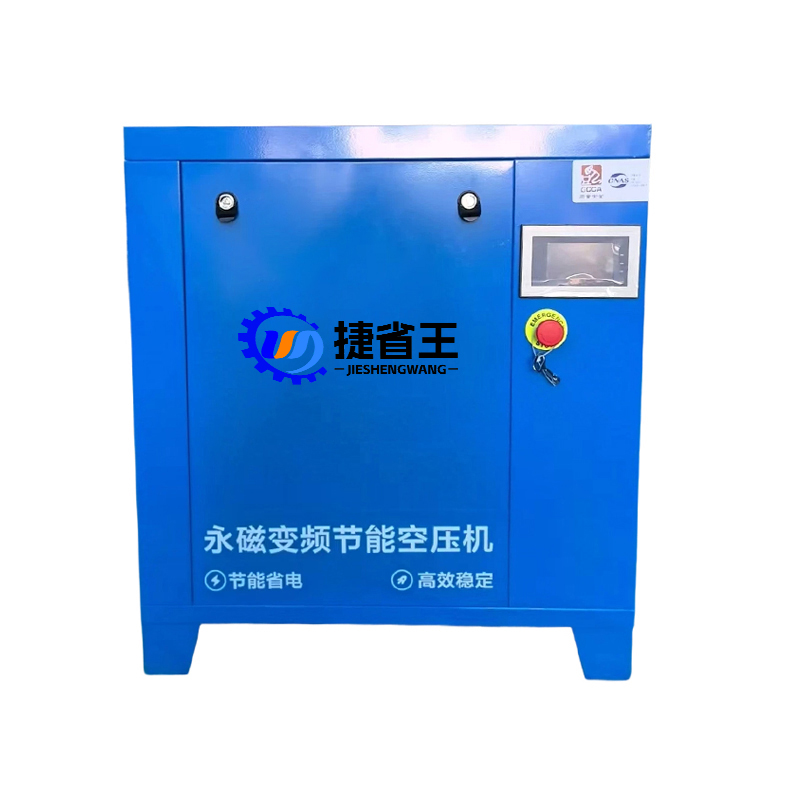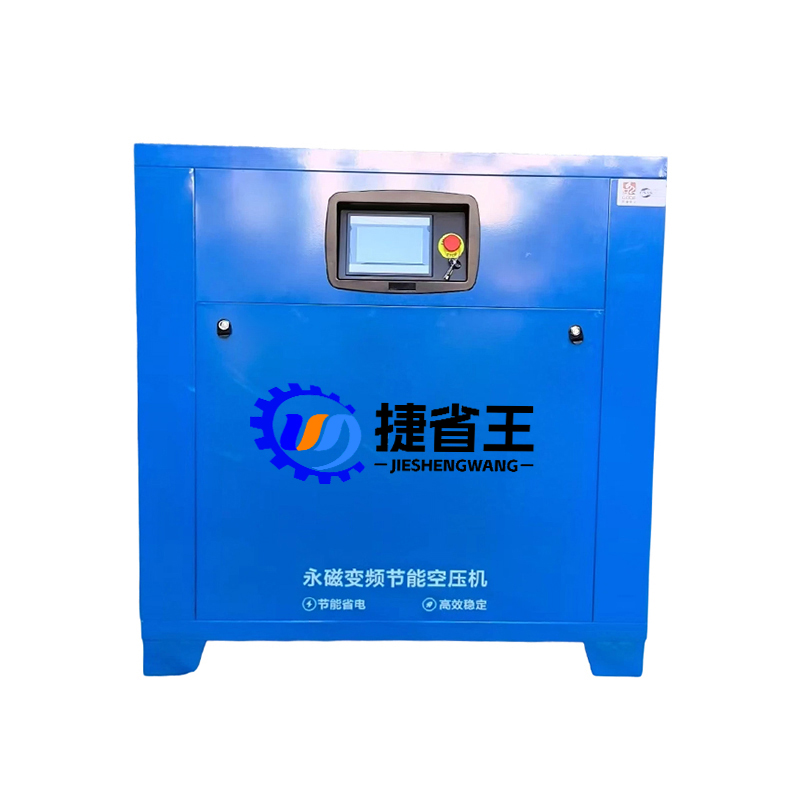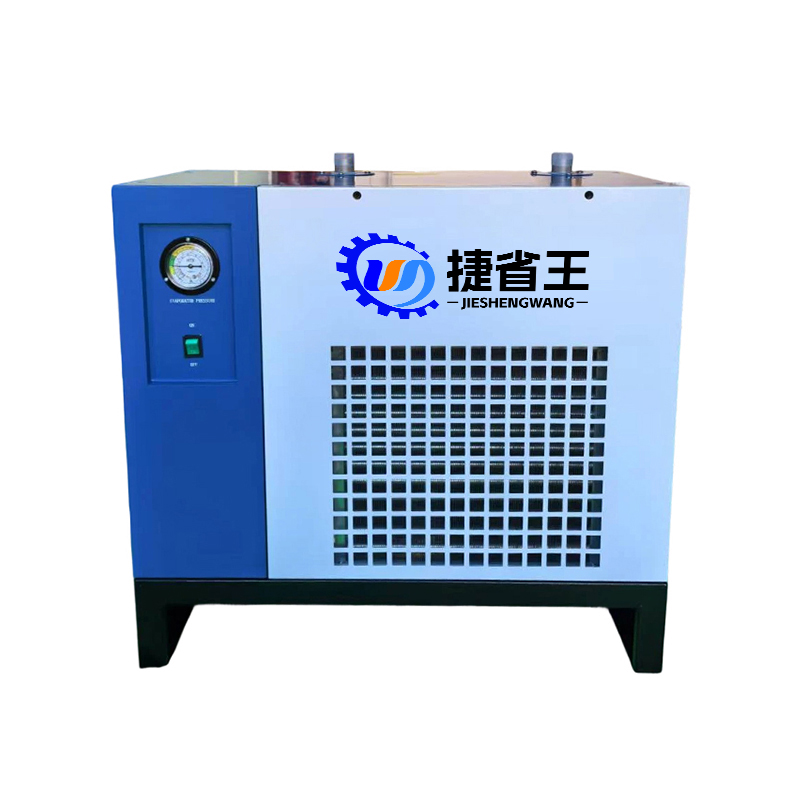How does the permanent magnet variable frequency air compressor use intelligent control to improve its operating efficiency?
Release Time : 2025-03-18
The permanent magnet variable frequency air compressor can significantly improve its operating efficiency through intelligent control.
1. Intelligent control to achieve precise adjustment
The permanent magnet variable frequency air compressor can achieve precise control of the compressor's operating status by combining permanent magnet synchronous motors with frequency converters and using advanced intelligent control technology. Traditional air compressors usually adjust their output by opening and closing, which not only consumes a lot of energy, but also cannot meet the fluctuations in actual gas consumption. The permanent magnet variable frequency air compressor can adjust the speed in real time according to actual needs, thus avoiding unnecessary energy waste.
2. Efficient response of the intelligent frequency modulation system
The intelligent frequency modulation system of the permanent magnet variable frequency air compressor has a fast dynamic response capability, which can adjust the working state of the compressor according to the changes in gas consumption in a very short time. This dynamic response capability makes the permanent magnet variable frequency air compressor more comfortable in dealing with sudden gas demand, and can quickly increase the speed to meet the gas demand, avoiding the impact of insufficient gas pressure on production. At the same time, when the gas consumption is low, the air compressor can automatically reduce the speed, reduce the gas production, and further reduce energy consumption.
3. Intelligent sleep strategy reduces idling standby loss
The permanent magnet variable frequency air compressor also has an intelligent sleep function. When the equipment is in a low demand or zero demand state for a long time, the intelligent control system will automatically determine and start the sleep mode. At this time, the motor stops running, and only the weak power of the control system is retained to maintain monitoring. Once the gas demand recovers, the air compressor can wake up quickly and seamlessly restore efficient gas supply. This intelligent sleep strategy greatly reduces the "idling standby" loss of the air compressor during non-production periods, further improving the operating efficiency.
4. Intelligent control system optimizes operating efficiency
The permanent magnet variable frequency air compressor is equipped with advanced intelligent control technology, which can continuously analyze the trend of gas consumption data, accurately determine the long-term low demand or zero demand state, and automatically adjust to the optimal operating state. In addition, the intelligent control system can also monitor the operating parameters of the equipment in real time, such as temperature, pressure, etc., to promptly discover and deal with potential problems, further improving the reliability and stability of the equipment. These algorithms can dynamically adjust the working state of the compressor according to the changes in actual gas consumption to ensure that every bit of energy is fully utilized.
5. Waste heat recovery function improves energy utilization
In addition to the above energy-saving measures, permanent magnet variable frequency air compressor also has the function of waste heat recovery. The heat generated during the operation of the air compressor can be converted into hot water or other forms of heat energy through the waste heat recovery device, which can be used for domestic hot water supply, heating or process heating, etc., further improving the utilization rate of energy.
The permanent magnet variable frequency air compressor realizes precise adjustment of the compressor operating state, efficient response, intelligent sleep, optimized operating efficiency and waste heat recovery through intelligent control, thereby significantly improving its operating efficiency. These technical advantages have made permanent magnet variable frequency air compressor widely used in modern industry and have become an important force in promoting industrial upgrading and technological innovation.
1. Intelligent control to achieve precise adjustment
The permanent magnet variable frequency air compressor can achieve precise control of the compressor's operating status by combining permanent magnet synchronous motors with frequency converters and using advanced intelligent control technology. Traditional air compressors usually adjust their output by opening and closing, which not only consumes a lot of energy, but also cannot meet the fluctuations in actual gas consumption. The permanent magnet variable frequency air compressor can adjust the speed in real time according to actual needs, thus avoiding unnecessary energy waste.
2. Efficient response of the intelligent frequency modulation system
The intelligent frequency modulation system of the permanent magnet variable frequency air compressor has a fast dynamic response capability, which can adjust the working state of the compressor according to the changes in gas consumption in a very short time. This dynamic response capability makes the permanent magnet variable frequency air compressor more comfortable in dealing with sudden gas demand, and can quickly increase the speed to meet the gas demand, avoiding the impact of insufficient gas pressure on production. At the same time, when the gas consumption is low, the air compressor can automatically reduce the speed, reduce the gas production, and further reduce energy consumption.
3. Intelligent sleep strategy reduces idling standby loss
The permanent magnet variable frequency air compressor also has an intelligent sleep function. When the equipment is in a low demand or zero demand state for a long time, the intelligent control system will automatically determine and start the sleep mode. At this time, the motor stops running, and only the weak power of the control system is retained to maintain monitoring. Once the gas demand recovers, the air compressor can wake up quickly and seamlessly restore efficient gas supply. This intelligent sleep strategy greatly reduces the "idling standby" loss of the air compressor during non-production periods, further improving the operating efficiency.
4. Intelligent control system optimizes operating efficiency
The permanent magnet variable frequency air compressor is equipped with advanced intelligent control technology, which can continuously analyze the trend of gas consumption data, accurately determine the long-term low demand or zero demand state, and automatically adjust to the optimal operating state. In addition, the intelligent control system can also monitor the operating parameters of the equipment in real time, such as temperature, pressure, etc., to promptly discover and deal with potential problems, further improving the reliability and stability of the equipment. These algorithms can dynamically adjust the working state of the compressor according to the changes in actual gas consumption to ensure that every bit of energy is fully utilized.
5. Waste heat recovery function improves energy utilization
In addition to the above energy-saving measures, permanent magnet variable frequency air compressor also has the function of waste heat recovery. The heat generated during the operation of the air compressor can be converted into hot water or other forms of heat energy through the waste heat recovery device, which can be used for domestic hot water supply, heating or process heating, etc., further improving the utilization rate of energy.
The permanent magnet variable frequency air compressor realizes precise adjustment of the compressor operating state, efficient response, intelligent sleep, optimized operating efficiency and waste heat recovery through intelligent control, thereby significantly improving its operating efficiency. These technical advantages have made permanent magnet variable frequency air compressor widely used in modern industry and have become an important force in promoting industrial upgrading and technological innovation.






